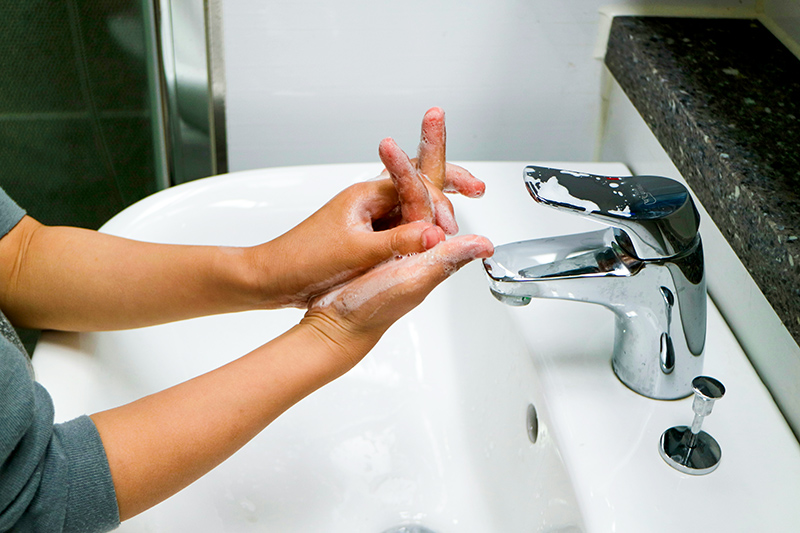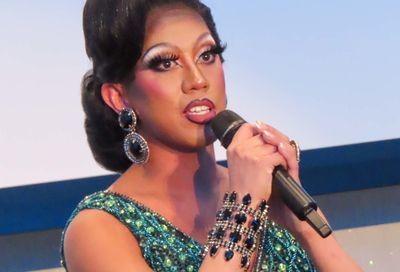Texas GOP sends bill barring trans athletes from sports teams to full House for vote
Proposed ban would eliminate exceptions granted for trans youth whose birth certificates have been changed to reflect their gender identity.

Republicans in Texas have voted to advance a bill seeking to bar transgender students from competing on sports teams matching their gender identity, setting it up for a vote in the House of Representatives.
The Texas House Select Committee on Constitutional Rights and Remedies — which was created by Texas House Speaker Dade Phelan (R-Beaumont) to address prioritized bills during what is now the third special session called since the regular legislative session ended — approved the anti-transgender bill, HB 25, on an 8-4 vote on Wednesday.
The bill’s passage marks the first time legislation of its type has managed to move to the next step in the legislative process. Similar bills, introduced during the regular and two previous special sessions, failed to advance out of the House Public Education Committee earlier this year.
Transgender individuals are currently barred from competing on sports teams that do not match the sex listed on their birth certificate, under guidelines set forth by the University Interscholastic League of Texas, which governs high school athletics in the state.
But the UIL also currently allows students who are transgender and who submit a birth certificate with an amended or corrected gender marker to compete on teams reflecting their gender identity.
HB 25, sponsored by Valoree Swanson (R-Spring), or its Senate counterpart SB 3 — which has already been passed by the upper chamber — would eliminate that exception to the rule, making membership on a team dependent on a student-athlete’s assigned sex at birth, regardless of whether they have undergone medical interventions related to a transition, such as receiving puberty blockers or hormone therapy.
Ahead of Wednesday’s hearing, several LGBTQ and allied groups rallied outside the Texas State Capitol to protest the proposed bill. Participating organizations included the Human Rights Campaign, the Transgender Education Network of Texas, Equality Texas, ACLU of Texas, Texas Freedom Network, and Lambda Legal.
“The Texas Legislature’s persistence in pursuing legislation that harms transgender youth reveals their perverse priorities,” Human Rights Campaign Texas State Director Rebecca Marques said in a statement. “Rather than focus on fixing the fragile, failing electrical grid, or reversing the anti-abortion legislation that has brought international condemnation on the state, or committing to equitable redistricting, the Texas Legislature continues its myopic, dogged pursuit of making it painful to be a transgender young person in Texas.”
The Texas bills currently under consideration are just two of more than 280 bills targeting the LGBTQ community that introduced in nearly three dozen legislatures throughout the country, and two of more than 130 bills targeting the transgender community specifically. That marks the highest number of anti-LGBTQ bills introduced in a single year since LGBTQ activists began tracking such statistics.
See also: Students at Central Texas high school walk out after trans girl barred from locker room
Proponents of the bills say they’re essential to protecting the “integrity” of sports and giving cisgender women the opportunity to compete for honors, award, or scholarships that they wouldn’t otherwise get if matched up against a transgender girl with biological advantages.
For example, Marco Roberts, the State Chairman of the Log Cabin Republicans of Texas, told ABC affiliate KTRK that the group for LGBTQ conservatives supports the bill because it’s needed to give cisgender female athletes a fair shot.
“We are in support of HB 25 to protect the original purpose of Title IX, so that women can compete in sports and have equal sports opportunity,” Roberts said. “Other people who are in this position of having their girls compete against trans athletes also deserve consideration for their children. Everybody’s kids count.”
But Ricardo Martinez, the CEO of Equality Texas, the state’s largest LGBTQ advocacy organization, says that the bill attempts to paint trans people as “caricatures” in order to make it easier to demonize transgender youth. He also told KTRK that no one can point to evidence that transgender youth are transitioning en masse and competing against cisgender females to win medals or honors.
In fact, a recent research brief from The Trevor Project, the nation’s top suicide prevention and crisis intervention organization for LGBTQ youth, notes that LGBTQ individuals are less likely to compete in sports in the first place, largely due to fears of discrimination or harassment at the hands of teammates, coaches, and other adults.
Even in the case of Mack Beggs, possibly the state’s most well-known transgender high school athlete, Beggs, a transgender male on hormones to assist his transition, was forced to wrestle against girls despite wanting to wrestle against boys because he did not have a birth certificate reflecting his gender identity. Furthermore, if HB 25 or SB 3 had been in effect when Beggs was in high school, nothing would have changed because the UIL would be forced to recognize Beggs as a “female” based on his assigned sex at birth — an inconvenient fact that undercuts the very rationale cited by proponents of the bill.

“The Texas Legislature launched an unprecedented attack on the LGBTQ+ community during the regular legislative session which has continued now for three special sessions. This unrelenting attack on innocent children is cruel,” Martinez said in a statement, noting that the bill passed despite only 55 people speaking in favor of its passage, while 291 Texans spoke against it.
“[T]he majority of Texans believe discrimination against LGBTQ+ people is wrong. Common sense policy doesn’t seek to harm Texans or ignore the negative implications of bills being proposed,” Martinez added. “Transgender children participating in sports is not a national emergency or a Texas emergency; these attacks on trans kids and the ongoing trauma to the trans community certainly are. This is unconscionable. We will continue to show up to the Capitol in opposition of these bills and will do everything we can to ensure they are defeated once and for all.”
The Trevor Project has noted that passing the bill may have profound impacts on the mental health and emotional well-being of transgender youth who see themselves being targeted. From January 1 to August 30 of this year, the organization received more than 10,800 crisis contracts, in the form of telephone calls, texts, or chats, from LGBTQ youth in the state — marking a 150% increase over the previous year. Nearly 4,000 of those “crisis contacts” were transgender youth.
See also: Athletes, women’s and civil rights groups support Idaho transgender runner’s lawsuit
Passing a transgender sports ban, or any bill perceived as anti-LGBTQ, may also have negative economic implications for the Lone Star State, as a coalition of business groups previously warned in a letter sent to Texas lawmakers.
Analyses conducted in the aftermath of North Carolina’s infamous “bathroom bill” passing in 2016 found that the bill may have cost the state as much as $3.76 billion in revenue over a 10-year period. Similarly, in 2017, when Texas lawmakers flirted with passing a similar “bathroom bill,” the Texas Association of Businesses estimated that the state could lose up to $8.5 billion in revenue.
Furthermore, opponents note that other bills seeking to block transgender youth from competing in organized sports have not held up well in the courts. A bill in Idaho barring transgender students from competing in women’s sports was blocked by a federal judge last year. In July, a federal judge in West Virginia issued an injunction blocking the state from enforcing its newly-approved transgender sports ban.
“For the seventh time this year, the Texas Legislature is attempting to pass an unnecessary and unconstitutional bill that will cause undeniable harm to children,” Adri Pèrez, a policy and advocacy strategist for the ACLU of Texas, said in a statement.
“Similar laws have already been declared unconstitutional in courts around the country, yet Texas continues to place a cruel and relentless target on transgender kids and their families. Anyone who votes for this bill will be rejecting the recommendations of women’s sports experts and the will of the people — all for the senseless purpose of unlawfully discriminating against kids. No child should have to defend their right to be respected equally.”
See also:
Most Americans support LGBTQ nondiscrimination laws, but trans rights continue to divide
Born Perfect tackles conversion therapy through puppets and Patton Oswalt
Catholic priest pleads guilty to spending church money on Grindr dates and boyfriends
Support Metro Weekly’s Journalism
These are challenging times for news organizations. And yet it’s crucial we stay active and provide vital resources and information to both our local readers and the world. So won’t you please take a moment and consider supporting Metro Weekly with a membership? For as little as $5 a month, you can help ensure Metro Weekly magazine and MetroWeekly.com remain free, viable resources as we provide the best, most diverse, culturally-resonant LGBTQ coverage in both the D.C. region and around the world. Memberships come with exclusive perks and discounts, your own personal digital delivery of each week’s magazine (and an archive), access to our Member's Lounge when it launches this fall, and exclusive members-only items like Metro Weekly Membership Mugs and Tote Bags! Check out all our membership levels here and please join us today!
























You must be logged in to post a comment.